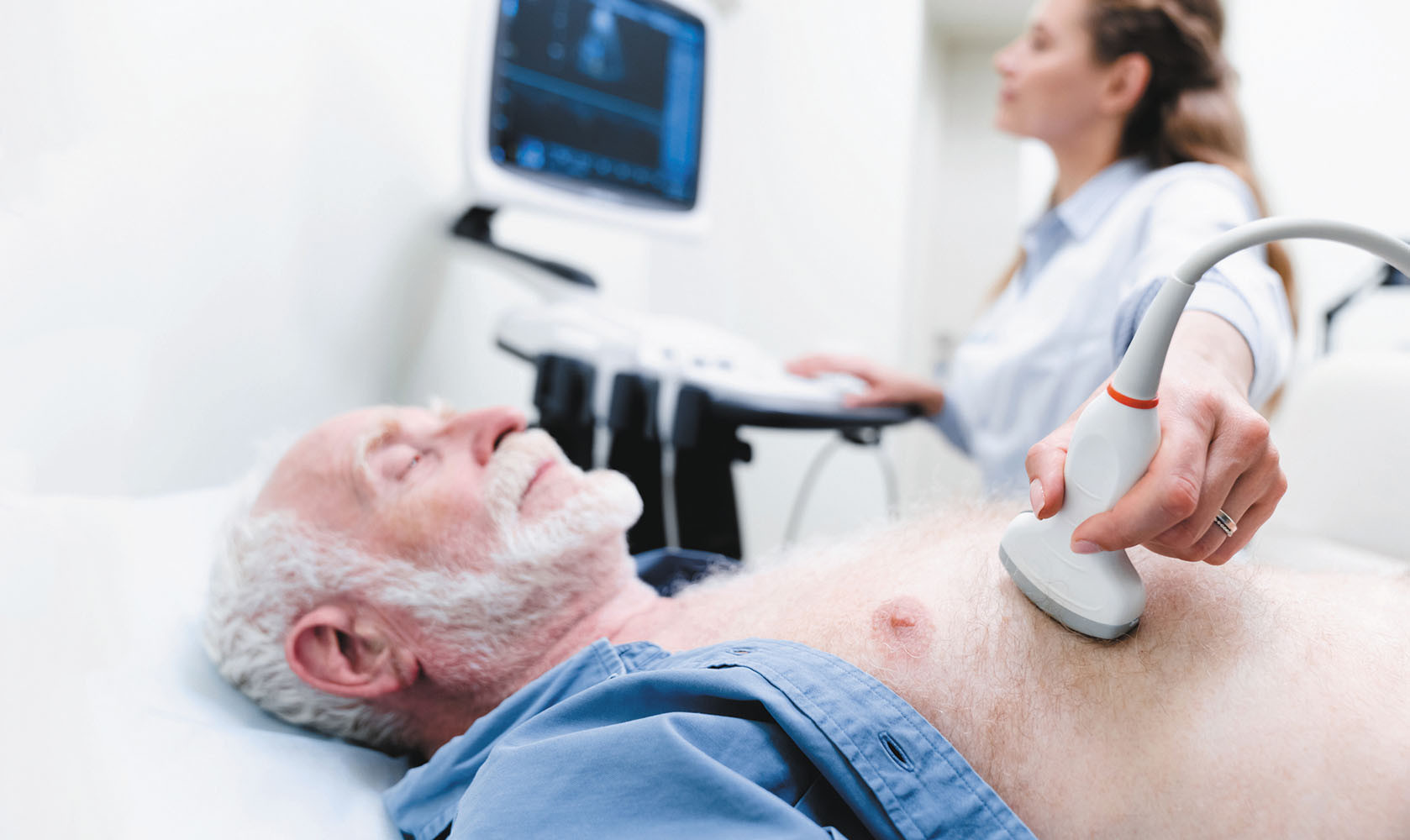
Counting steps is good — is combining steps and heart rate better?

Appendix pain: Could it be appendicitis?

Can saw palmetto treat an enlarged prostate?

How does Ozempic work? Understanding GLP-1s for diabetes, weight loss, and beyond

Zinc: What it does for the body, and the best food sources

Respiratory health harms often follow flooding: Taking these steps can help

Tips to leverage neuroplasticity to maintain cognitive fitness as you age

Can white noise really help you sleep better?

Celiac disease: Exploring four myths

What is prostatitis and how is it treated?
Heart Health Archive
Articles
The story on heart stents
Whether you've had a stent placed or may need one in the future, here's what you should know about these tiny devices
Close to a million heart stents to open blocked or narrowing arteries are implanted each year in the United States, and as you age, the odds rise that you'll end up on the list of recipients.
"Getting a stent can save your life during a heart attack, but what you do after the procedure can dictate your future heart health," says Dr. C. Michael Gibson, a cardiologist with Harvard-affiliated Beth Israel Deaconess Medical Center.
How much will fried foods harm your heart?
News briefs
Fried foods carry heart risks in part because they spur inflammation. But how many servings of crispy French fries does it take to raise your risk for cardiovascular disease? Not many, suggests a large analysis published online Jan. 18, 2021, by the journal Heart. Scientists pooled the findings of 17 studies on fried foods and problems like heart attacks, clogged coronary arteries, heart failure, and stroke. The studies included more than half a million people. Researchers also looked at the data from another six studies assessing the association of eating fried food and dying prematurely. Those studies involved more than 750,000 people. People who ate the most fried foods each week were 28% more likely to have heart problems, compared with people who ate the least. Each additional 114-gram (4-ounce) serving of fried foods per week bumped up overall risk by 3%. But the analysis failed to show that people who ate lots of fried foods were more likely to die prematurely. Besides provoking inflammation, fried foods are often also high in sodium as well as harmful saturated fats. If you choose to indulge in them, do it sparingly. And avoid foods fried in animal fats; instead, choose foods fried in vegetable oils.
Image: © Amarita/Getty Images
Updated advice for people with heart valve disease
With expanded options for replacing stiff or leaky heart valves, more people can avoid surgery.
The heart's four valves open and shut in a carefully timed sequence to move blood through and out of the heart to the body. But as people age, these one-way valves may narrow and stiffen — a problem known as stenosis — which partially limits blood flow. Heart valves can also leak, allowing blood to flow backward; that's called regurgitation.
About one in 10 adults ages 65 and older has moderate to severe heart valve disease. Without timely diagnosis and treatment (see "Monitoring heart valve disease"), valve problems can worsen, causing serious and sometimes fatal consequences. The good news: More people who need a new heart valve can get one without major surgery.
Which blood pressure number matters most?
Ask the doctor
Q. My doctor told me I should get a home monitor to keep tabs on my blood pressure. Which number is most important in the reading, the top or the bottom one?
A. This question comes up often, perhaps because doctors and patients alike tend to pay more attention to the top (first) number, known as systolic pressure. It reflects the amount of pressure inside the arteries as the heart contracts. The bottom (second) number, diastolic pressure, is always lower since it reflects the pressure inside the arteries during the resting phase between heartbeats.
What’s for dinner?
If you need inspiration, here are some heart-friendly suggestions from Harvard cardiologists.
Even if you enjoy cooking, chances are you find yourself wondering what to make for dinner once in a while — especially if you're trying to eat more healthfully. And maybe you or someone in your household avoids all animal products or follows a low-carb eating style. Perhaps you need an easy meal for a quick weeknight supper or something a little fancier for a special occasion.
No matter what your family's preferences, there's a wealth of options when it comes to following a diet that promotes cardiovascular health. The two main guidelines: include plenty of plant-based foods (especially fruits and vegetables), and choose mostly unprocessed or minimally processed foods. Below, five cardiologists who treat patients at Harvard-affiliated hospitals share their favorite meals, along with some of the inspiration for their choices.
Depression and heart disease: A double-edged sword?
Lifestyle changes — along with other proven therapies — can help improve these often-overlapping conditions.
Everyone goes through periods of feeling gloomy, irritable, or listless at least once in a while. And these emotions are perfectly normal after a diagnosis of a serious health problem such as heart disease. But if those unpleasant feelings drag on for weeks and gradually erase your sense of well-being, you may have depression.
Over a lifetime, about one in five Americans is affected by depression. But the risk of depression in people who've had a heart attack is three times as high as the risk among the general population.
Why you should consider hiring a personal trainer
A good one can provide motivation and customized advice on a safe, effective, and well-rounded exercise routine.
Exercise is one of the pillars of heart disease prevention. But at some point, you may need help shoring up your workout habits. Maybe you exercise only in fits and starts, without sticking to a regular routine. Or perhaps you're in a rut, doing the same old 30-minute trudge on the treadmill every day.
Another possibility: You have a health condition (such as high blood pressure or arthritis) or another physical problem (an old knee or back injury, for example) that makes you hesitant to exercise. For all of these reasons and more, hiring a personal trainer can be a sound investment.
Genetic testing to tailor heart drug prescriptions?
Your genes affect how your body responds to many drugs. But pharmacogenomic testing still isn't ready for routine use.
Most genetic tests focus on your odds of developing certain diseases or health conditions. But some — known as pharmacogenomic (or pharmacogenetic) tests — can reveal how your body may respond and react to different medications. To date, researchers have identified more than 400 genetic variations known to affect the metabolism of numerous drugs, including some that help lower cholesterol or prevent blood clots (see "Pharmacogenomics of common heart drugs").
In theory, knowing how people metabolize specific drugs could help doctors choose the safest, most effective treatment for their patients. But in practice, it's not that straightforward, says Dr. Jason Vassy, assistant professor of medicine at Harvard Medical School and a primary care physician at the VA Boston Healthcare System.
Fruit of the month: Tropical fruits
Tropical fruits are those native to warm, tropical climates and include everyday favorites such as bananas and oranges. Here, we're highlighting a few slightly more exotic choices that deserve a place on your shopping list at least once in a while. Try these suggestions when you're craving something sweet for a snack or after dinner.
Pineapple. Sure, canned pineapple is convenient, but the flavor of a fresh pineapple is far more vibrant. Try pineapple chunks tossed with chopped fresh mint.
Can fitness counter fatness?

Counting steps is good — is combining steps and heart rate better?

Appendix pain: Could it be appendicitis?

Can saw palmetto treat an enlarged prostate?

How does Ozempic work? Understanding GLP-1s for diabetes, weight loss, and beyond

Zinc: What it does for the body, and the best food sources

Respiratory health harms often follow flooding: Taking these steps can help

Tips to leverage neuroplasticity to maintain cognitive fitness as you age

Can white noise really help you sleep better?

Celiac disease: Exploring four myths

What is prostatitis and how is it treated?
Free Healthbeat Signup
Get the latest in health news delivered to your inbox!
Sign Up











